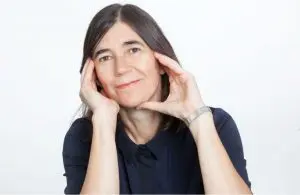HEALTH | 2021.04.02
“Getting older increases our risk of developing cancer even more than smoking does”
 Cancer is one of the leading causes of death worldwide. On World Cancer Day, we interview María Blasco, Scientific Director of the CNIO, about the current status of the disease in Spain and the importance of maintaining science and research as the best tools to face humanity’s future challenges.
Cancer is one of the leading causes of death worldwide. On World Cancer Day, we interview María Blasco, Scientific Director of the CNIO, about the current status of the disease in Spain and the importance of maintaining science and research as the best tools to face humanity’s future challenges.
Caption: María Blasco, photographed by Amparo Garrido/CNIO.
Question (Q): Research has contributed to high survival rates for some tumors. What is the current situation? What are the CNIO’s most pressing challenges?
Answer (A): One of the aims of the CNIO is studying metastasis to develop therapeutic strategies and drugs to prevent it from occurring. Metastasis remains the leading cause of cancer death.
(Q): According to REDECAN, the Spanish network of cancer registries, 277,000 new cancer cases are diagnosed annually in Spain. Will this scenario get worse or can we stop it in its tracks?
(A.): We expect it to get worse. This is due to the increasing number of elderly people in Spain, which is known as population aging. Getting older increases our risk of developing cancer even more than smoking does. This is because every time our tissues need to repair or regenerate, our cells need to multiply by copying their genetic material to the daughter cells. This copying process is not perfect and damages our DNA, which sometimes leads to cancer.
“Modern science has responded quickly to Covid, precisely because many of the discoveries already made by scientists in other branches of science”
(Q): Many risk factors associated with cancer are related to smoking, alcohol and a sedentary lifestyle. Are we currently at greater risk?
(A.): Smoking damages our DNA even more and that increases the risk of developing cancer. The same applies to other toxic substances associated with pollution, asbestos, radiation and food.
(Q): The past year has been a milestone for science, but it has also relegated diseases other than COVID-19 to the background, delaying detection and treatment. The Spanish Society of Medical Oncology (SEOM) has warned of a state of limbo. How do we resolve this?
(A): As scientists, we know that science never stops. The treatments that work today resulted from research that was not in the spotlight back when it was taking place. Stopping science means stopping hopes for a better future with less disease. Modern science has responded quickly to Covid, precisely because many of the discoveries already made by scientists in other branches of science have been adapted to this new disease. Science is the best tool we have to face humanity’s future challenges, and research must never stop.
(Q): Coronavirus may increase the risk of complications in some cancer treatments, which has been called a cancer syndemic in the current context. How do we protect this vulnerable group? Can and should we get vaccinated?
(A): Vaccination guidelines are determined by the government. I understand that they will take this and other aspects into account when choosing which groups to vaccinate first.
